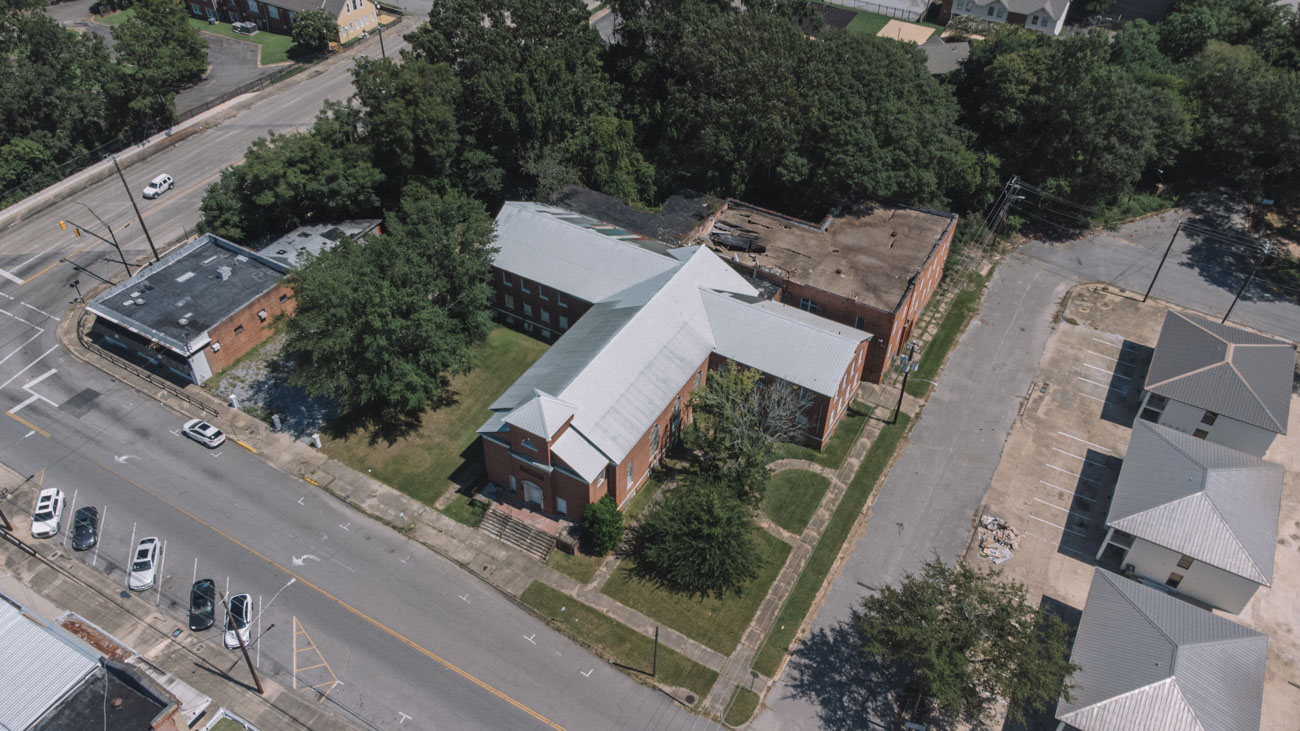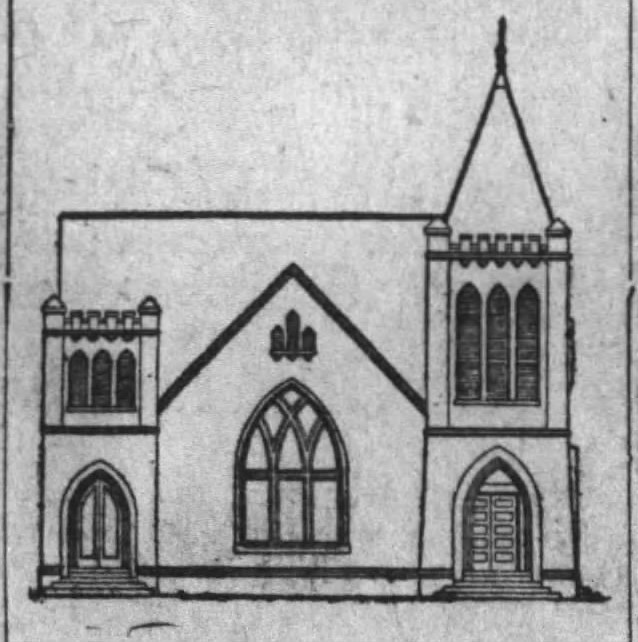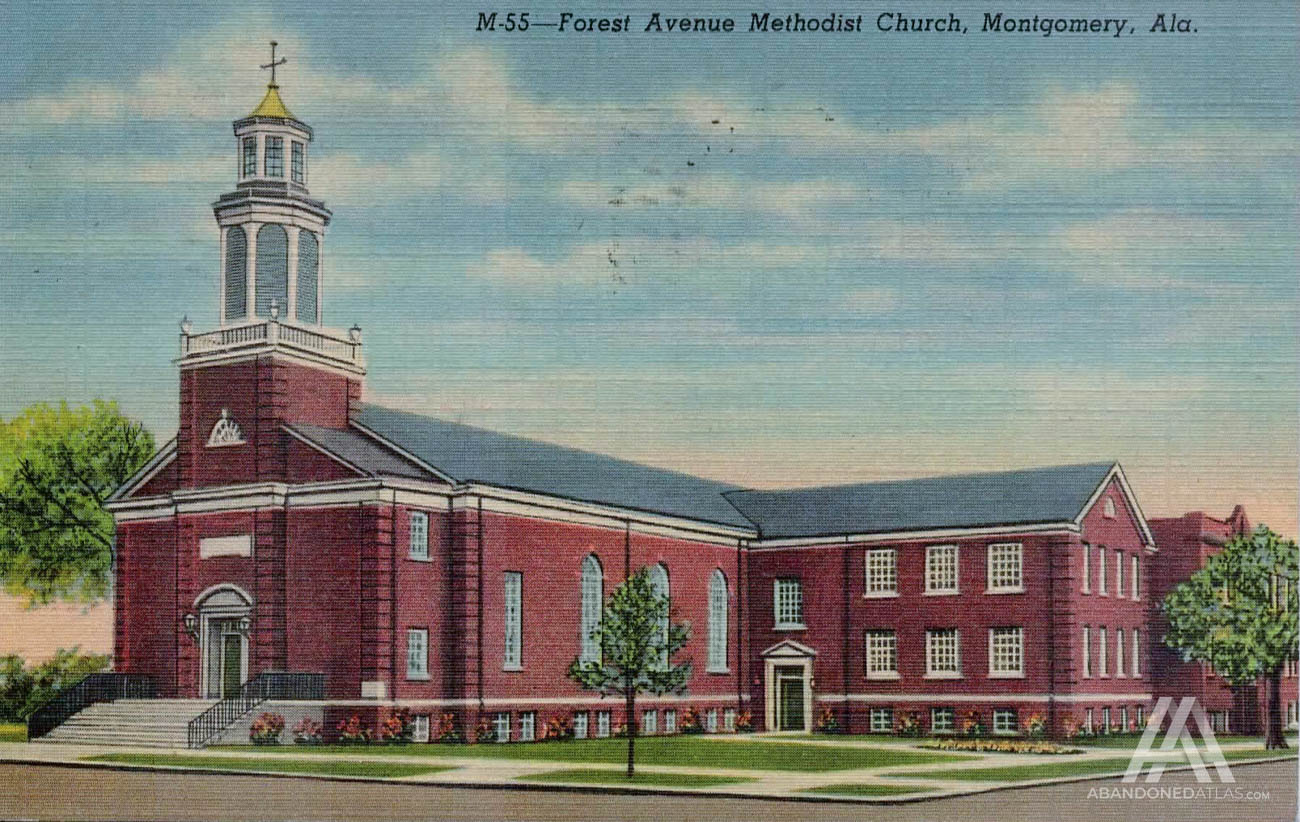| City/Town: • Montgomery |
| Location Class: • Religious |
| Built: • 1946 | Abandoned: • ~1984 |
| Status: • Abandoned |
| Photojournalist: • David Bulit |
Table of Contents
Forest Avenue Methodist Church
In 1896, the Dexter Avenue Methodist Church began a mission in the Highland Park area of Montgomery. The mission met in an old abandoned building along the Central of Georgia railroad tracks. In the early 1900s, members of Dexter Avenue and Court Street Methodist Church realized that Highland Park was in the process of becoming a residential community as young families had begun buying and building homes in the neighborhood. At the time, Highland Park was the easternmost boundary of the city. The members felt a new Methodist Church was needed in Highland Park.
Original 1903 Building
A building committee was named and composed of R. E. Steiner, chairman of the committee; Adolph Roemer, Charles G. Zirkle, W. M. Teague Jr., and Samuel C. Starke. Two lots on the corner of Forest Avenue and Rhodes Street was purchased at a cost of $600. Ground was broken for the new building on May 1, 1903, and the Forest Avenue Methodist Episcopal Church South was completed on June 27, 1903, at the cost of $2,307. The contractor was C. Y. Bogacki. This church was a simple one-room gray wooden building.
Reverend Frank Seay was appointed as the first pastor, and the first sermon was preached on June 28, 1903, by Dr. J. S. Frazer, then presiding elder of the Montgomery District. Records show that the church had 34 members at the time. It wasn’t until 1908 that the Forest Avenue Methodist Church was officially dedicated by Bishop H. C. Morrison of Birmingham.
1912 Brick Sanctuary
The congregation steadily grew and by December 1907, it was reported that the church had 312 members. It was around this time that church officials found it necessary to construct a more commodious building. The original building was moved back and construction began on a new brick church in March 1910. Constructed was completed in 1912.
The new building was comprised of two rooms, the main auditorium and the Sunday School in the rear. The church was constructed of pressed brick and white stone trimmings and featured Gothic elements, namely the doors and windows. The main tower was surmounted by a slender tower with a second tower erected over the Sunday School. The auditorium had a seating capacity of about 400, and the Sunday School had approximately 200.
In September 1928, an educational annex was constructed at the unheard cost of $100,000. In the summer of 1933, the first Vacation Bible School in the state was held at the church. There were 251 children of every denomination in attendance. Although Forest Avenue was the youngest Methodist church, it ranked as the third largest in the city of Montgomery.
Tragedy struck on December 15, 1944, when a fire broke out in the sanctuary. Despite there being a fire station located just around the corner and firefighters responding to the scene within minutes, the building could not be saved. On the following Sunday, the congregation met at the First United Methodist Church in what is now Old Cloverdale, and pledges were made for rebuilding. The congregation continued to meet at the Sunday School building and despite not having a proper church to worship in, membership continued to grow. By 1947, the membership of Forest Avenue had increased to 1,666 making it the second largest Methodist church in the city.
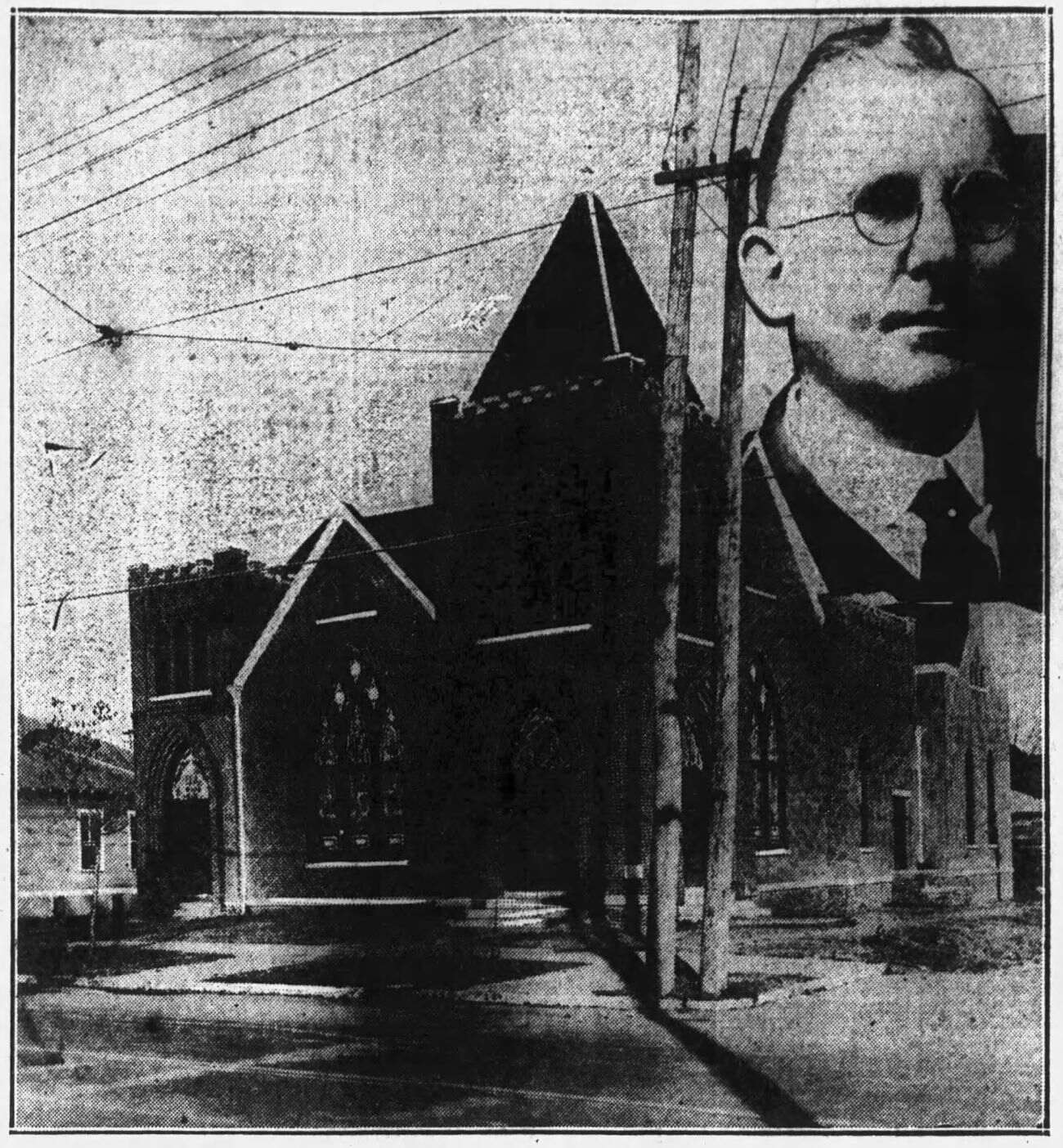
1946 Building
A building committee was named and composed of Frank Doby, chairman of the committee; B. T. Tucker, B. Nolen, Mrs. M. A. Mitchell, H. D. Scott, R. S. Neal, and T. M. Jones. The new church building was completed in 1946 and opened for public worship on March 30, 1947. The Reverend Sam R. Jones delivered the first sermon, the subject of which was, “Jesus, Wonderful in Death.” Bishop Clare Purcell dedicated the new building on June 15, 1947.
By the late 1950s, church membership had declined significantly as families began moving away from Highland Park. Other members were displaced by the construction of Interstate 85 and Jackson Hospital. A conference was held in August 1970 where the remaining church members, approximately 200 by this time, voted to relocate the church. In December 1970, ten acres of land were purchased on Vaughn Road, and on August 1, 1971, the congregation voted to change the name of the church to Aldersgate United Methodist Church. The last service was held at the Forest Avenue Methodist Church on April 8, 1973.
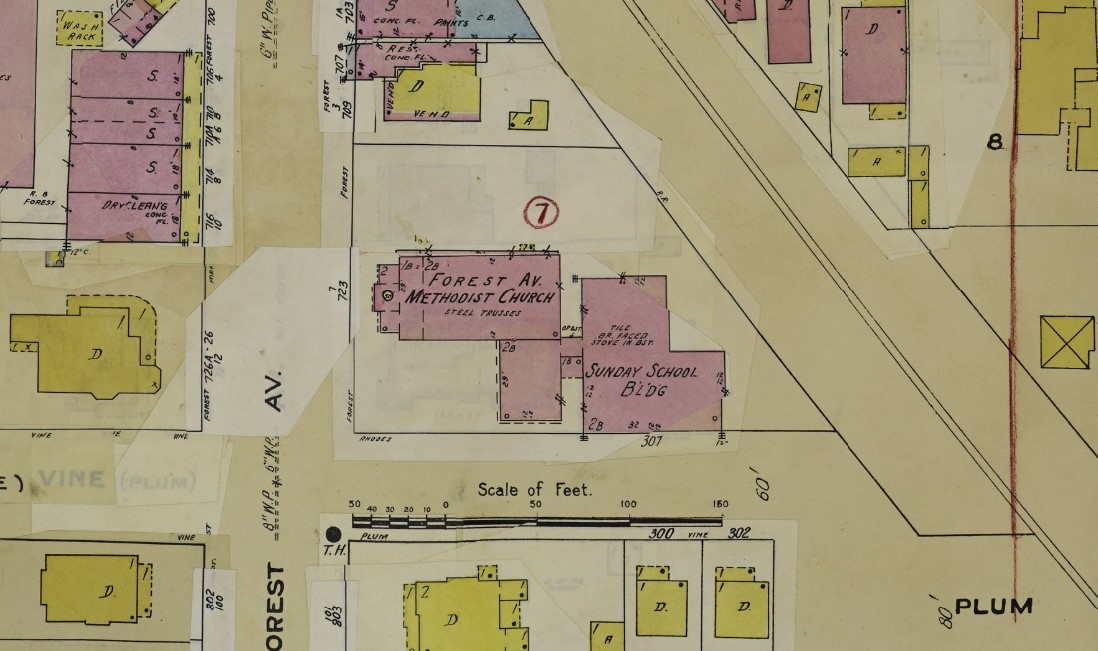
Department of Pensions and Security
After Aldersgate United Methodist Church vacated the building, it was sold to Montgomery County for $190,000. The county spent an additional $100,000 to convert the church’s interior into office space. It was during these renovations that the spire was removed. In 1974, the Montgomery Department of Pensions and Security (P&S) moved from its second-floor offices at the Montgomery County Courthouse to the renovated Forest Avenue Methodist Church. The county food stamps office also occupied space in the former church.
In 1982, city fire marshalls declared the building unsafe. By this time, the food stamps office had already moved out of the building to its new office at the renovated Capitol Motor Company dealership on Goldthwaite Street. The former Bellas-Hess department store at 810 West South Boulevard was chosen for the new location of the Pensions and Security office. Since the food stamps program was administered through Pensions and Security, the food stamps office would have to move from their office on Goldthwaite as well.
P&S director Ada Kate Morgan refused to comply with instructions to move, believing that the food stamps office was in an ideal location and better suited for the public than the Bellas-Hess building. The move was delayed multiple times as the P&S office continued to operate on a “crisis basis” at Forest Avenue. It wasn’t until newly appointed P&S state commissioner Leon Frazier that a plan was agreed upon—the P&S office would move from Forest Avenue to the South Boulevard location and the food stamps office would remain at their office on Goldthwaite.
In 1984, the former Forest Avenue Methodist Church was sold to Paul Corwin and Bill Blake for $161,900 with the sole intention of reselling it. According to locals, the building became a venue for local professional wrestling sometime in the late 1980s. There have been a few efforts made since then to rehabilitate and reuse the dilapidated church, but none have been successful. Considering the state of disrepair it’s currently in, it may be too late to save it.
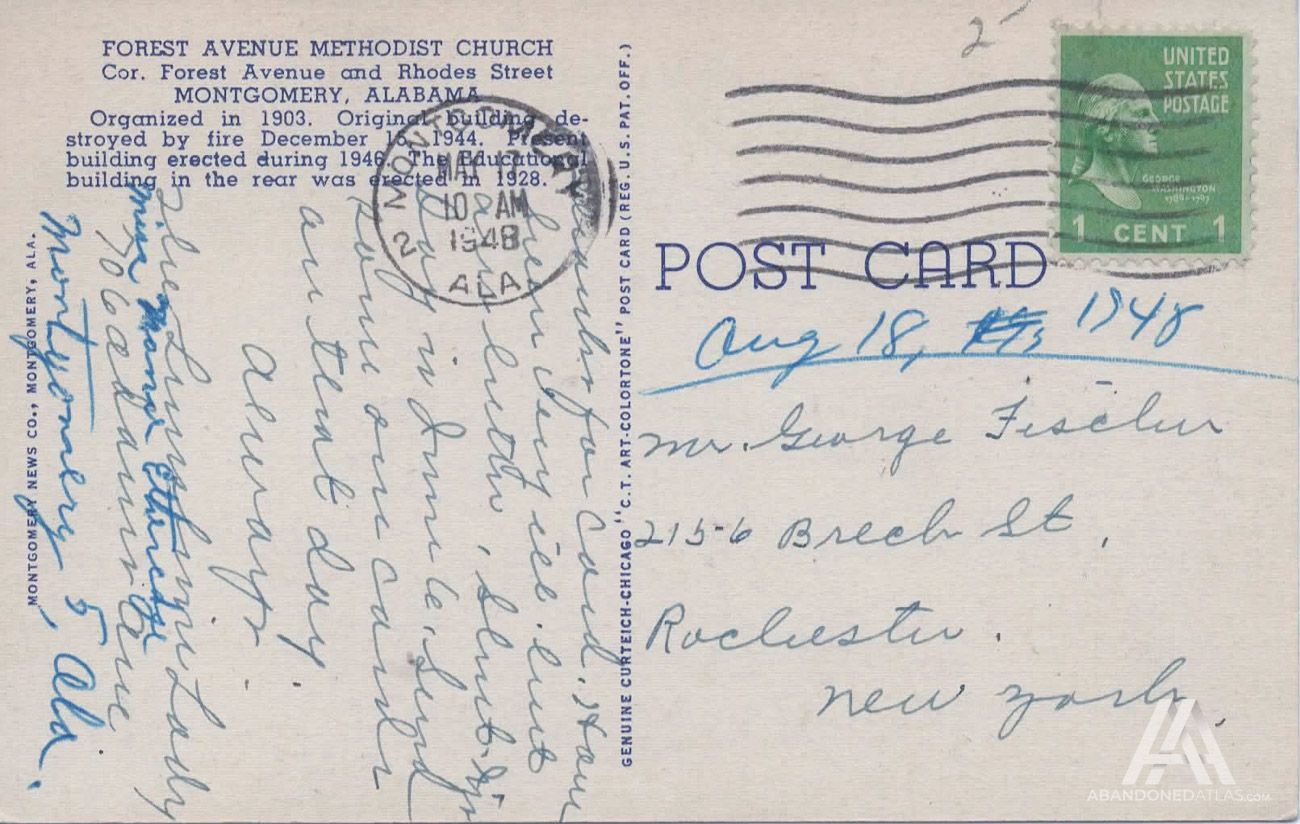
Photo Gallery
References
Aldersgate Union Methodist Church; Mary Ellis. (retrieved September 9, 2022). History
The Montgomery Advertiser. (November 28, 1921 p. 3). CHURCHES OF MONTGOMERY
The Montgomery Advertiser. (March 13, 1910 p. 28). NEW BUILDING DEMANDED; GROWTH OF FOREST AVENUE CHURCH IS RAPID
The Montgomery Advertiser. (March 30, 1947 p. 35). Forest Avenue Methodist Entering New Home Today
The Montgomery Advertiser; Joy Whetstone. (March 21, 1983 p. 14). County office prepares to move

